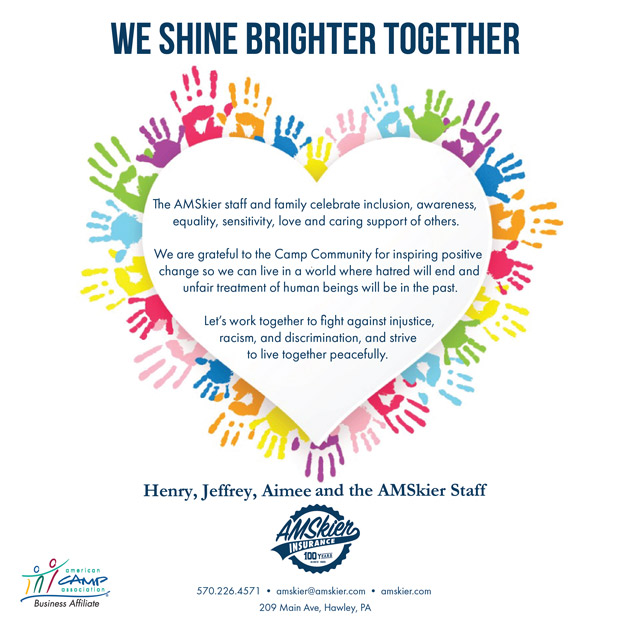The passion of many former campers, staff, and other individuals associated with camp is undeniable. The ability to harness that passion toward efforts that can support camp — through active participation in communication, events, financial support, and community advocacy — is a goal for countless camp directors. But circumstances seem to be keeping some camps from achieving this goal. In the camp world of recruiting staff, running programs, and just keeping the lights on, developing a robust, sustainable alumni program tends to take a back seat. However, it doesn’t have to. You can run a successful camp alumni program, and we’ll show you how.
People, Process, and Technology
A common model used to describe the necessary components for any successful project or program is “people, process, and technology.” Deficiencies in any of these areas can make your project much more difficult to implement and maintain. Specifically:
People
The person(s) responsible for your camp alumni program should not have this duty added on to existing responsibilities, as the program will then have to compete with other tasks that may take priority. Find a dedicated person to oversee your alumni program. The individual does not have to be full-time but should be able to focus solely on the responsibilities and plan necessary to execute your program. It might be helpful for such a person to have a sincere interest in your camp’s history, because chances are good that alumni who are contacted will want to share stories, pictures, and other sorts of camp paraphernalia. A person who pays close attention to detail related to data collection is also helpful — this is the history of your camp, and you want names to be spelled correctly, associations to be accurately tracked, and additional personal data to be properly recorded.
Processes
Think of the processes piece as your manual for what you want to accomplish with your alumni program. The following are some basics to consider:
- Who specifically do you want to include as alumni?
- How are you going to communicate with your alumni, how often will you do this, and what type of content do you want to include?
- What types of events would you like to hold and when?
- How can you engage enthusiastic alums who may not be able to get back to camp in person but want to stay involved?
- What is your process for adding new alums to your list and maintaining information on your existing alums?
When considering the scope of your alumni program, start small and build. Choose a task or activity that you know you can sustain and build upon as your alumni efforts grow. Periodic communication is critical. It doesn’t have to be fancy, just consistent. Success often depends on managing expectations. If you promise too much but don’t deliver, you run the risk of disappointing your most passionate supporters, and regaining lost trust and credibility can be challenging.
Technology
Even with the best people and well-defined processes, it still comes down to execution. The tools you have to help implement your alumni program can be crucial. These might include:
- Social media
- Technology that allows for bulk emails
- Online/printed newsletters and blogs
- Databases capable of capturing all the information you want to record
The tools you need will be defined in part by the processes you want to accomplish.
Where Do I Start?
Before hiring any staff or deciding upon what technology/tools to purchase, focus on your processes. This can be accomplished right away. Bring together your stakeholders who are the most interested in the success of your alumni program — key staff, interested board members, active alums — and brainstorm on what you would like to see happen. Once you have agreed on some general ideas, do a deeper dive into the logistics of communication, events, data collection, and other identified priorities. The type of staff you subsequently hire (full-time, part-time) and the tools you need will be dictated by these process discussions.
Consider contacting other camps with alumni programs to get a sense of their successes and failures. Browse camp websites to learn how camps engage their alumni.
How Do I Initially Pay for Staff?
You may encounter initial pressures on where the money comes from to add an additional staff person and procure the resources necessary to run an alumni program. For camps with tight budgets, this money could come from outside sources, such as grants or contributions from a few generous alumni who really want to see such a program get underway. Successful alumni programs will soon see these positions pay for themselves. Camps are frequently compared to colleges when it comes to passionate alumni followings that span the country (if not the world) — certainly colleges view alumni programs as no-brainers when it comes to budgeting resources to support those programs. Camps — and oversight organizations that run some of them — need to recognize the same.
Finding Alumni
You’re ready to roll. Now all you need to do is locate your alumni!
Search through whatever resources you may currently have available, anything that lists names of people and ideally their association with camp at a specific point in time:
- Old camp newsletters
- Camper and staff rosters
- Minutes from camp committee or board meetings
- Files of past media coverage
- Followers on the camp’s social media sites (Facebook, Twitter, etc.)
Enter this information in your tracking database, even if you don’t have current contact information yet.
You’ll probably come across some names multiple times — those individuals who have been at camp for several summers, for example. These may be the people you want to focus on first to contact about your newly established alumni program. Not only will they potentially have a higher interest in the program, but they may also have additional resources and contacts for fellow alumni.
Some outstanding (and free) resources to locate alumni exist online. Even if you have an older address, try websites like fastpeoplesearch.com. This is one of several sites that tracks prior addresses of individuals and then displays current addresses plus additional information — relatives, age, aliases, etc. — that can help narrow down if this is the correct person. The following states have online searchable voter records that can confirm residents’ latest addresses:
- Arkansas
- Colorado
- Connecticut
- Delaware
- Florida
- Michigan
- North Carolina
- Ohio
- Oklahoma
- Rhode Island
Some states and counties provide online property searches through county auditor offices. And don’t underestimate the value of a simple Google search, especially if you know additional information like a school attended or an occupation. Results may lead to a LinkedIn profile or a Facebook page that can provide additional information.
Locating alumni does take time, but this is time well spent to learn more about your alumni and build those relationships. If you need to research large lists, consider gathering a group of volunteers to assist.
Your First Contact — What Is Your Elevator Speech?
If you are reaching out to alumni for the first time in many years, be honest and transparent about your reasons for doing so. Alums may legitimately be suspicious about why you’re now contacting them after 20, 30, or 40 years. Don’t ask for money. Try to reconnect based on an event, anniversary, history project, or special honor for a legendary camp figure. This message should be clear and shared with all camp staff, as contacts with alums can occur in a variety of ways — not only with outreach efforts but during camp/staff fairs, on-site camp activities, and through electronic means such as the camp’s website and social media.
A very common first contact with alumni may be through the person answering your camp’s office phone. Many conversations start out with the caller stating that they went to your camp years ago. Train your staff to pick up on this information and note the caller’s contact information so your alumni person can follow up with them. If you have staff who are promoting camp in your community, train them to take note of the same information when someone introduces themselves as a camp alum or the child of an alum. Your previous campers are looking for you just as much as you are looking for them. So be sure that your camp alumni coordinator’s contact information is clearly stated on your website.
Data Collection
It’s not only important to have a good tool to record and display the data you want to maintain on alumni, but also to understand the types and value of the data you are going to collect.
Many things about people will change throughout their lives — names, addresses, phone numbers, occupations, social media accounts, and possibly gender. Inevitably, you will “lose” alumni, and the type of information you have about them will determine your success in finding them again. The more information you have that tends to change little if at all (birth dates, schools attended, relatives, summers spent at camp), the better the chance of being able to locate them once more.
Experienced alumni directors are likely to become very good sleuths, using all sorts of resources to track down leads. One rather morbid resource is obituaries. A Google search may uncover that an alum has passed away. As sad an event as that may be, an online obituary may not only give you more information about the alum that you didn’t know, but it may also provide information about relatives’ names and their locations, some of whom may also be persons of interest.
Your database tool should be able to handle all types of information that you want to record, including camp associations, schools, relatives, social media accounts, and a place for comments or notes.
This Sounds Great, but I’m Still Not Ready
Establishing an alumni program is not an effort to be taken lightly, and even the initial step of identifying your processes with interested stakeholders involves some organization and coordination.
Still, you can take steps right now that will be very helpful when the time eventually comes to get started with your alumni program. Review the information you are currently collecting on campers, staff, board members, and volunteers. What will tend to change and what will tend to remain the same? If someone is viewing this information five, 10, 20 years from now, how helpful will it be? Are names spelled correctly? Is the data available in a computable format that can potentially be transferred to a database later on? Is there accurate information on how these people are associated with your camp? Small efforts today will create your camp’s future history and the documentation that people may rely on to find alumni.
Don’t Delay — and Good Luck!
The establishment of an alumni program can be one of the most rewarding aspects of your camp, not just financially but in expanding your community and maintaining relationships with all the wonderful people who have experienced your camp in the past. Every year delayed is another year of opportunities to reconnect lost. Start small, stick with it, be consistent, and enjoy the great fellowship of camp people.
Photo courtesy of Surprise Lake Camp, Cold Spring, New York.
Stuart T. Weinberg, MD, is an associate professor in the Departments of Biomedical Informatics and Pediatrics at Vanderbilt University Medical Center. His camp career spans 55 years as a camper, staffer, camp board member, volunteer, ACA section board and committee member, and alumni consultant. He and his coauthor have presented at numerous ACA National Conferences on the topic of developing camp alumni programs. Stuart can be reached at [email protected].
Katie Tucker Trippi is in her 13th year as alumni and development director for YMCA Camp Echo. She began as a volunteer finding alums and building the Camp Echo Alumni database, which has grown to more than 20,000 alums, making it possible to raise over $315,000 annually and $6.5 million total since 2005. Katie can be reached at [email protected].




